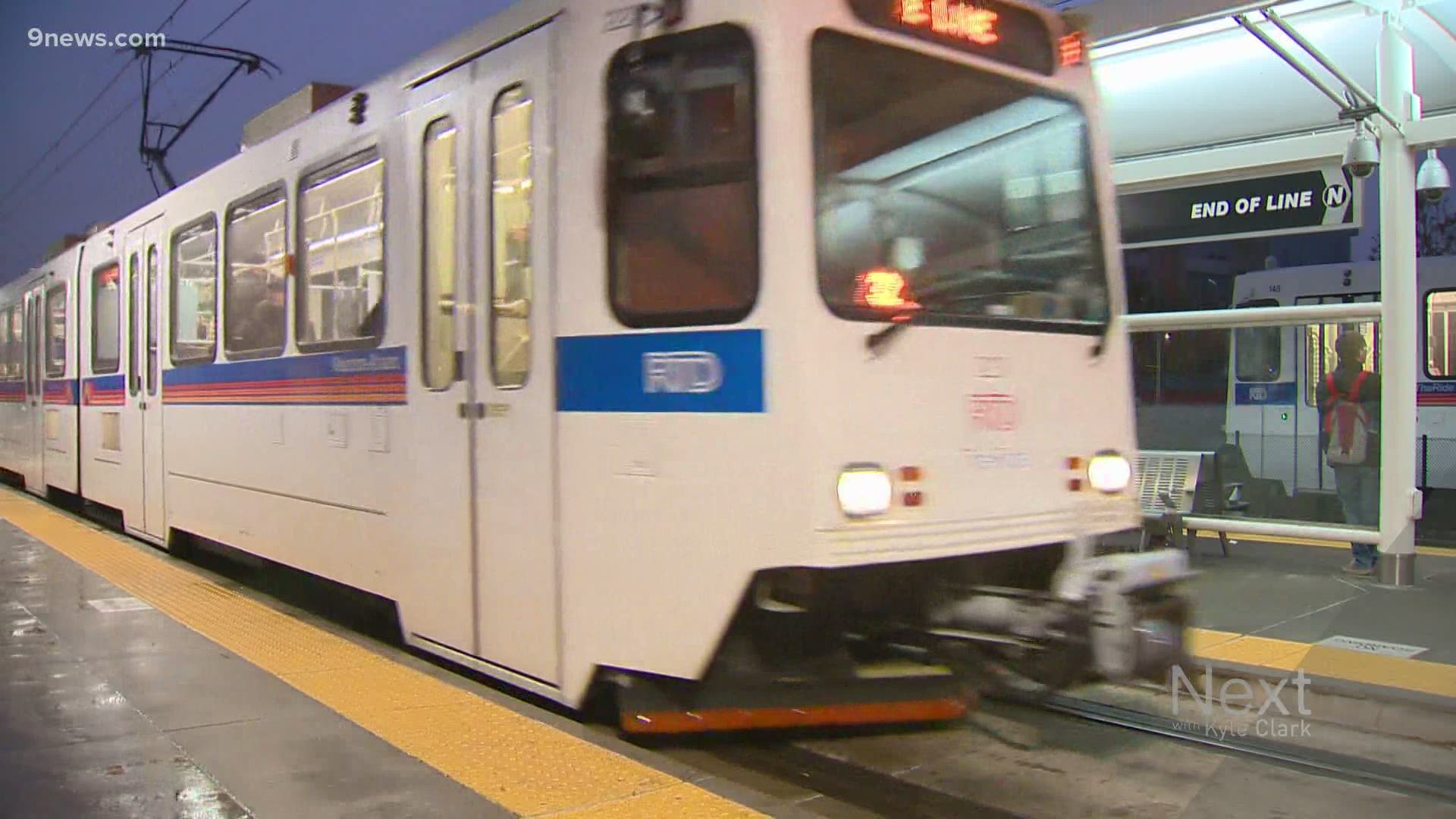DENVER — Regional Transportation District (RTD) staff will suggest cutting 25-30% of budgeted positions, which could work out to about 635 employees losing their jobs, according to an internal memo to RTD staff Tuesday afternoon obtained by Next with Kyle Clark.
The proposed cuts include both salaried and union workers, according to the memo sent by RTD’s Interim CEO Paul Ballard.
The president of Amalgamated Transit Union Local 1001, Lance Longenbohm told Next representatives from RTD told him in a recent meeting that the agency was looking at eliminating 650 union-represented positions, 470 of which were filled.
Next has reached out to RTD for comment on the potential layoffs.
“RTD is fear-mongering,” Longenbohn wrote in the statement, blaming budget cuts on excessive spending on management and faulty budget projections.
The memo to staff also details potential tiered furloughs for salaried RTD staff making more than $60,000 per year. The suggested range for furlough days went from six days to 18 days for those making $180,000 or more.
At a study session on the budget issues last week, RTD’s Chief Financial Officer Heather McKillop presented board members with scenarios to cut the budget to address the $166 million gap. Her proposal suggested making $14 million in cuts to administrative costs.
But the proposed layoffs come after four years of aggressive recruiting for RTD. An operator shortage over that time led the agency to required mandatory overtime for its employees, some of them working six-day weeks to fill shifts for the agency’s growing service schedule.
“To let folks go after the length of time they supported us is wrong,” RTD Director Jeff Walker, who represents parts of Denver, Englewood and Sheridan said reacting to the union’s statement Tuesday.
Walker believes any layoffs would be premature with the unpredictability of COVID-19. He said he would hate for the agency to have to try to re-hire drivers when ridership picks back up and revenues begin to flow into the agency. He wouldn’t comment directly on any plan about layoffs because he said much is currently being discussed.
In March, RTD’s elected board approved cuts to the district’s service schedule to address that shortage. The board also approved temporary service cuts because of a drop in ridership relating to the pandemic.
The district’s service schedule was reduced by 40 percent because of COVID 19. It will likely stay that way until ridership and sales tax revenue improve for RTD as a cost-saving measure.
Other cost-saving measures include deferring projects to other years and re-directing funds that would have gone towards saving to complete FasTracks projects, like a long-awaited train from Denver to Longmont, and spending that money on operations.
For years, RTD has saved to complete the remaining portions of FasTracks, a 2004 sales tax referendum approved by metro Denver voters to expand RTD’s system. The most anticipated part of that project, an expansion of the B Line from Denver to Longmont, was last projected to cost $1.5 billion. The agency has $120 million in savings
Some members of RTD’s board have advocated using the savings account for FasTracks to help RTD’s finances in the short term.
“We spent years growing into this promise of FasTracks, and suddenly it’s time to stop,” Denver RTD Director Kate Williams said, arguing the agency current needs outweigh the desire to build out FasTracks.
Board members who represent the north area where that train to Longmont would be built have argued the train is a promise to the taxpayers and using any savings should be a last resort.
They argue the money currently saved could be used as emergency reserves should another economic calamity befall RTD. Advocates for keeping the savings also argue the money could be used as matching funds should a federal grant or other private funding for the train come along.
“What you do in a depression is stimulate the economy,” RTD Board Director Judy Lubow, who represents the RTD district that includes Longmont, argues. She said a public project like building a train might be a worthwhile federal investment to put people back to work.
RTD received $233 million in federal CARES Act funding during the height of the pandemic, but according to Ballard’s memo, that funding will be exhausted by the end of the year.
“Dropping more federal money into this agency is not the solution,” RTD Director Natalie Menten, who represents Lakewood, said. “It needs to tighten its belt.”
Menten has long argued RTD administrators salaries are bloated. At least nine of the agencies senior leaders make more than $200,000 a year. Menten has proposed a 15 percent cut of those salaries on top of any furlough days the administrators may have to take. She said other board members have resisted.
“I cannot even believe that I am getting resistance from board directors when we are getting ready to layoff hundreds of people,” Menten said.
She also wants the board to consider a lower starting salary as it works to negotiate with a new general manager this week.
“We’re going to hire a general manager for potentially $300,000 or more when we just sent out notice of layoff of hundreds of employees,” Menten said. “We need to be trimming the belt from the very top position on down.”
Menten also criticized the union for not accepting furlough days earlier that could have staved off some layoffs. Salaried employees of RTD had to take nine furlough days spread out throughout 2020.
“Furloughs would never have been able to address the magnitude of what is being proposed,” union president Longenbohm said.
RTD’s board will discuss potential 2021 cuts at a board study session on Sept. 15.
SUGGESTED VIDEO: Full Episodes of Next with Kyle Clark

